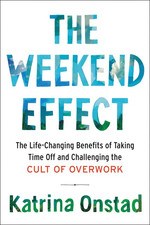The Weekend Effect: The Life-Changing Benefits of Taking Time Off and Challenging the Cult of Overwork
May 23, 2017
In her new book, The Weekend Effect, Katrina Onstad points to an unsettling reality of modern life—we have ceded the weekend back to work.
 A day of rest is mandated by all the world's major religions. Workers fought and died (many just down the street from us in the Bay View massacre of 1886) for the eight-hour workday, and the two-day weekend. And, yet, we have ceded the weekend back to work.
A day of rest is mandated by all the world's major religions. Workers fought and died (many just down the street from us in the Bay View massacre of 1886) for the eight-hour workday, and the two-day weekend. And, yet, we have ceded the weekend back to work.
In her new book, The Weekend Effect, Katrina Onstad points out an unsettling reality of modern life that most of us know too well:
For many of today's (gratefully) employed, the workweek has no clear beginning or end.
And this is not just bad for our sense of wellbeing and balance; it is literally hazardous to our health. Overwork leads to stress, sleep loss, disease, and early death. In Japan, Onstad tells us, there is even a word—karoshi—for "death from overwork." The most popular advocate for proper sleep today, Arianna Huffington, realized its importance only "when she herself collapsed from exhaustion, waking in a pool of blood and with a broken cheekbone after logging eighteen-hours days working."
On top of the hazards to our health, there's no logical reason for it or benefit that stems from working so many hours. Onstad reveals reams of research that there is, "no correlation between long hours and economic success," and that it's just bad for business.
Since the first research on productivity was published in the 1900s, experts have found, over and over, that workers are most productive when working eight hours a day, up to forty hours per week. … There may be some gains in a short-term increase in hours—a couple of weeks of overtime on a big project at sixty to seventy hours per week—but after the second week of working long and late, productivity drops off rapidly.
Onstad begins by exploring the history of the five-day, forty-hour workweek, and then details how we've let it slip away. Part of it is the gig economy, part of it the virtual call button we all carry in our pockets these days. And part of it is that the cult of ambition and work in the place that brought us both—Silicon Valley—and how it has been adopted by business culture at large, where busy-ness and working long hours has become a badge of pride. (To be fair, it's not only Silicon Valley that promotes this kind of marathon overworking—Goldman Sachs recently mandated interns work no more than 17 hours a day after a burnout death in 2015.) Onstad doesn't mince words in countering that cultural narrative:
Their expecting crippling hours from digital employees is no different from the Victorian foreman waving his pocket watch at the sooty factory workers. The quality of the output is the only measure that should matter. "You can choose to work long, hard or smart, but at Amazon.com you can't choose two out of three," [Jeff] Bezos wrote in a 1997 letter to shareholders. But actually, you should choose: the last two. The first one is bullshit.
Katrine Onstad is on a mission to spread real fertilizer of another sort—a good weekend. The Weekend Effect is labor history, a cultural treatise, a reminder of the importance of real human connection and what is truly important in life, and a manifesto for taking back the weekend all wrapped up in one.
We have 20 copies available.

